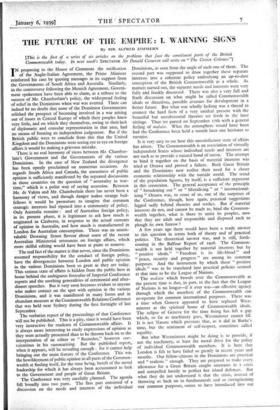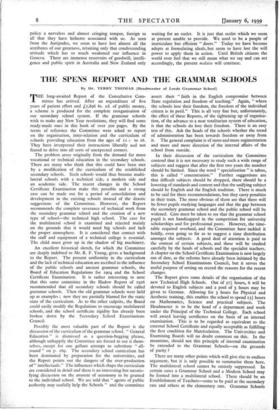TM FUTURE OF. THE EMPIRE : I. WARNING SIGNS
By SIR ALFRED ZIMMERN [This is the first of a series of six articles on the problems that face the constituent parts of the British Commonwealth today. In next week's SPECTATOR Sir Donald Cameron will write on " The Crown Colonies"] IN proposing to the House of Commons the ratification .1 of the Anglo-Italian Agreement, the Prime Minister reinforced his case by quoting messages in its support from the Governments of South Africa and Australia. Similarly, in the controversy following the Munich Agreement, Govern- ment spokesmen have been able to ,claim, as a ,tribute to the success of Mr. Chamberlain's policy, the widespread feeling of relief in the Dominions when war was averted. There can indeed be no doubt that none of the Dominion Governments relished the prospect of becoming involved in a war arising out of issues in Central Europe of which their peoples knew very little, and on which they themselves, owing to their lack of diplomatic and consular representation in that area, had no means of forming an independent judgement. But if the British public were to conclude from this that the United Kingdom and the Dominions were seeing eye to eye on foreign affairs it would be making a grievous mistake.
There is no real harmony of views between Mr. Chamber- lain's Government and the Governments of the various Dominions. In the case of New Zealand the divergence has been openly proclaimed on numerous occasions. As regards South Africa and Canada, the uneasiness of public opinion is sufficiently manifested by the repeated discussions in those countries on the question of " neutrality in war- time," which is a polite way of saying secession. Between Mr. de Valera and Mr. Chamberlain there has never been a harmony of views, and though danger makes strange bed- fellows it would be premature to imagine that common strategic interests had ripened into a community of policy. Only Australia remains : and of Australian foreign policy, in its present phase, it is legitimate to ask how much is originated in Canberra, in response to the actual currents of opinion in Australia, and how much is manufactured in London for Australian consumption. There was an unmis- takable Downing Street flavour about some of the recent Australian Ministerial utterances on foreign affairs, which more skilful editing would have been at pains to remove.
" The real fact of the matter is that never, since the Dominions assumed responsibility for the conduct of foreign policy, have the divergencies between London and public opinion in the various Dominions been so great as they are today. This serious state of affairs is hidden from the public here at home behind the ambiguous formulae of Imperial Conference reports and the soothing generalities of ceremonial and after- dinner speeches. But it very soon becomes evident to anyone who makes contact on the spot with opinion in the various Dominions, and it was manifested in many forms and in abundant measure at the Commonwealth Relations Conference that was held near Sydney during the first fortnight of last September.
The verbatim report of the proceedings of that Conference will not be published. This is a pity, since it would have been very instructive for students of Commonwealth affairs. It is always more interesting to study expressions of opinion as they were actually presented than to be thrown back on to the interpretation of an editor or " Recorder," however con- sdentious in his summarising. But the published report, when it appears, will be revealing enough : for it cannot help bringing out the main feature of the Conference. This was the bewilderment of public opinion in all parts of the Common- wealth at finding itself, for the time being, bereft of the moral leadership for which it has always been accustomed to look to the Government and people of Great Britain.
The Conference was very carefully planned. The agenda fell broadly into two parts. The first part consisted of a discussion on the needs and interests of the individual Dominions, as seen from the angle of each one of them. The second part was supposed to draw together these separate interests into a coherent policy embodying an up-to-date conception of the British Commonwealth as a whole. As matters turned out, the separate needs and interests were very fully and franldy discussed. There was also a very full and frank discussion on what might be called Commonwealth ideals or directives, possible avenues for development in a better future. But what was wholly lacking was a thread to connect the hard facts of a very unideal present with the beautiful but unsubstantial theories set forth in the later sittings. Thus we parted on September 177th with a general feeling of malaise. What the atmosphere would have been had the Conference been held a month later one hesitates to surmise.
It is very easy to see how this unsatisfactory state of affairs has arisen. The Commonwealth is an association of virtually independent States whose individual needs and interests are not such as to provide a natural bond of union. The attempt to bind it together on the basis of material interests was tried at Ottawa and proved a failure. Both Great Britain and the Dominions now realise their need for a closer economic relationship with the outside world. The trend of the population figures, by itself, is a sufficient argument in this connexion. The general acceptance of the principle of " broadening out " or " liberalising " or " international- ising " Ottawa was, to some of us, one of the surprises of the Conference, though, here again, practical suggestions lagged sadly behind theories and wishes. But if material interests do not, and cannot be made to, bind the Common- wealth together, what is there to unite its peoples, now that they are adult and responsible and disposed each to plough its own furrow ?
A few years ago there would have been a ready answer to this question in terms both of theory and of practical politics. The theoretical answer was, and is still, forth- coming in the Balfour Report of 1926. The Common- wealth is not held together by material interests but by " positive ideals." " Freedom is its life-blood " and " peace, security and progress " are among its common purposes. And the instrument by which these " positive ideals " was to be translated into practical policies seemed at that time to be the League of Nations.
The malaise which broods over the Commonwealth at the present time is due, in part, to the fact that the League of Nations is no longer—if it ever was—an effective agency through which the members of the Commonwealth can co-operate for common international purposes. There was a time when Geneva appeared to have replaced West- minster as the spiritual home of Commonwealth ideals. The eclipse of Geneva for the time being has left a gap which, so far as machinery goes, Westminster cannot fill. It is not Nature which prevents that, as it did in Burke's time, but the sentiment of self-respect, sometimes called equality.
But what Westminster might be doing is to provide, if not the machinery, at least the moral drive for the policy of individual Commonwealth members. It is here that London is felt to have failed so greatly in recent years and months. Our fellow-citizens in the Dominions are practical and " realistic " enough. They are prepared to make every allowance for a Great Britain caught unawares in a crisis and compelled hastily to perfect her island defences. But what they do not understand is that the crisis, instead of throwing us back on to fundamentals and so strengthening our common purposes, seems to have introduced into our policy a nerveless and almost cringing temper, foreign to all that they have hitherto associated with us. As seen from the Antipodes, we seem to have lost almost all the attributes of our greatness, retaining only that condescending attitude which has so much weakened our influence in Geneva. There are immense reservoirs of goodwill, intelli- gence and public spirit in Australia and New Zealand only waiting for an outlet. It is just that outlet which we seem at present unable to provide. We used to be a people of inarticulate but efficient " doers." Today we have become adepts at formulating ideals, but seem to have lost the will power to apply them in action. Until British citizens the world over feel that we still mean what we say and can act accordingly, the present malaise will continue.











































 Previous page
Previous page